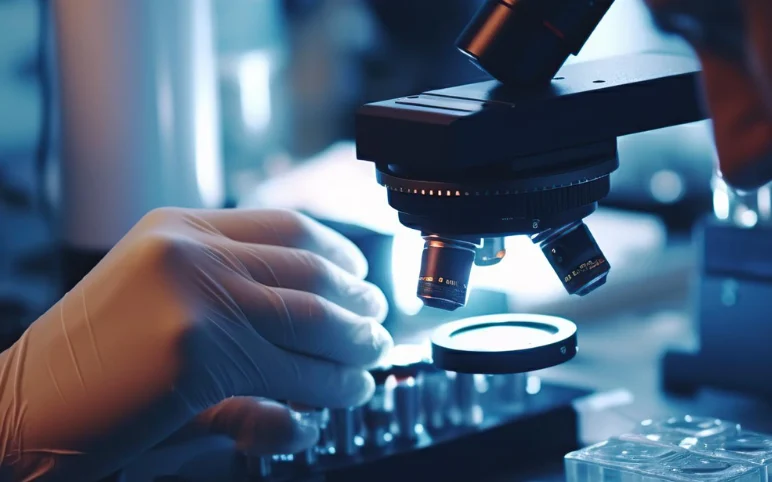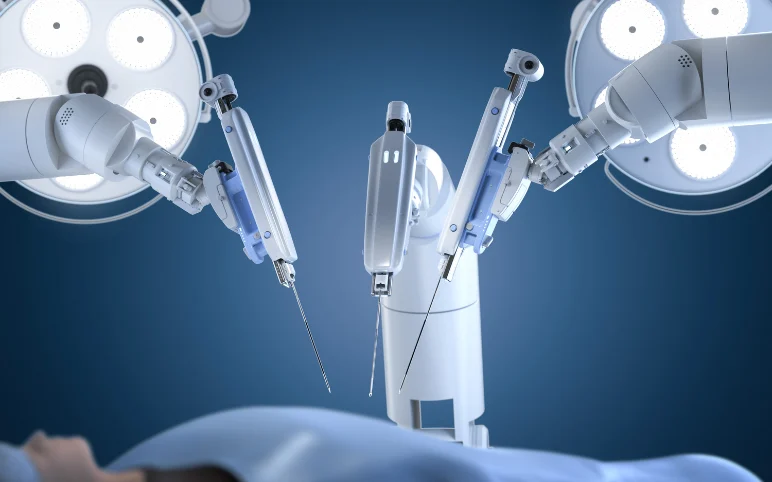BD Introduced Advanced Ultrasound Technology for IV Insertions to Help Drive First-Stick Success
On April 11, 2023, BD (Becton, Dickinson, and Company), a leading global medical technology company, announced the launch of a new, easy-to-use advanced ultrasound device with a specialized probe designed to provide clinicians with optimal IV placement.
The BD Prevue™ II System uses real-time needle depth markers to fill a gap in IV access. The device is compatible with catheters that support the BD Cue™ Needle Tracking System, which provides a high-quality ultrasound image of the needle trajectory. Simulated studies suggest that combining an ultrasound guidance system with a needle-tracking system may help to shorten the time and number of attempts required to successfully access a vessel.
A peripheral IV catheter administers IV therapy to more than 90% of hospitalized patients or hundreds of millions of patients annually. Nearly two-thirds of these patients, however, have vessels that are challenging to see and access, which frequently leads to more needle sticks, vessel damage, and infiltration into the surrounding tissue.
To increase the use of ultrasound for IV placement, the system is created with features that are convenient for clinicians. The BD Prevue™ II System, for instance, offers a specialized probe that is intended to help shorten the learning curve and ensure that clinicians can use the technology without changing their current insertion technique or field of view.
“Difficult IV access remains far too common today, but the availability of the BD Prevue™ II System supports a future where every needlestick has a predefined pathway for successful placement. BD is advancing the vision of a ‘One-Stick Hospital Stay,’ and first-stick success is the first requirement to fulfill that vision. First-stick success also reduces the pain and anxiety patients often experience while undergoing multiple IV access attempts and provides clinicians with IV workflow efficiencies and confidence.”
Eric Borin, worldwide president of Medication Delivery Solutions at BD
“Patients living with chronic conditions like heart failure may suffer from poor circulation and large amounts of scar tissue from frequent venous access making their veins more difficult to locate and creating a challenge for placing a good, lasting peripheral IV line. With the use of ultrasound guidance technology, we can quickly and successfully place IVs in our hard-to-stick patients, leading to quicker treatment and fewer sticks for our patients, and a better experience for everyone involved.”
Lisa Wilson, a registered nurse and night shift lead for the progressive cardiac care unit at INTEGRIS Health Baptist Medical Center in Oklahoma City Okla
According to DelveInsight’s “Ultrasound Devices Market” report, the global ultrasound devices market was valued at USD 6.76 billion in 2021, growing at a CAGR of 6.82% during the forecast period from 2022 to 2027 to reach USD 10.05 billion by 2027. The ultrasound devices market is witnessing positive growth owing to the rising incidence of chronic diseases such as cardiovascular, urology, and others. Further, rapid technological developmental activities, growing awareness for early detection, increasing geriatric population across the globe who are more susceptible to developing chronic disorders, and the rising adoption owing to no radiation exposure, and others are thereby contributing to the growth of the ultrasound devices market during the forecast period.
Avation Medical Announced US FDA 510(k) Clearance for the Vivally® System
On April 11, 2023, Avation Medical, Inc., the innovator in patient-friendly, closed-loop neuromodulation options to treat life-altering medical conditions, announced that its Vivally System received US Food and Drug Administration (FDA) 510(k) clearance.
Vivally is a non-invasive bladder control therapy device and mobile application for treating patients with overactive bladder (OAB) syndrome-related urinary urgency and urge urinary incontinence (UUI).
Only the Vivally System has been approved for sale in the United States as a closed-loop, non-invasive neuromodulation system for bladder control. Closed-loop control continuously modifies therapy parameters to ensure optimal output throughout the session while objectively confirming tibial nerve activation.
OAB, a highly prevalent and debilitating chronic condition that affects more than 42 million women and men in the United States, is primarily characterized by urinary urgency and UUI. Even though there are numerous efficient treatments available, very low patient adoption rates and poor therapy compliance continue.
Through an ankle-worn garment, the Vivally System sends an electrical signal to the patient’s tibial nerve. Each patient receives a customized therapy plan from the clinician, who also prescribes the Vivally System for use at home. The Vivally Controller provides individualized therapy for each patient by utilizing an exclusive closed-loop control algorithm and electromyography (EMG).
“Millions of people suffer from urinary urgency and urge urinary incontinence who do not want invasive surgery or the unwanted side effects of drugs. With 30-minute at-home therapy sessions as little as once per week, and a mobile application with an electronic bladder diary and progress tracking, Vivally provides an effective treatment option that patients can easily fit into their schedule”
Jill Schiaparelli, Avation CEO
According to DelveInsight’s “Urinary Incontinence Devices Market” report, the global urinary incontinence devices market was valued at USD 2.97 billion in 2021, growing at a CAGR of 6.36% during the forecast period from 2022 to 2027, to reach USD 4.30 billion by 2027. The urinary incontinence devices market is expected to witness growth due to the rising prevalence of urinary incontinence cases, development of innovative devices, aging population prone to urological conditions like urinary tract infections, weakening of pelvic floor, and conditions including pregnancy, diabetes, menopause, and Parkinson’s disease.
Cardiovascular Systems, Inc. Completed Enrollment in ECLIPSE Clinical Trial
On April 3, 2023, Cardiovascular Systems, Inc., a medical device company developing and commercializing innovative interventional treatment systems for patients with peripheral and coronary artery disease, announced the completion of enrollment of its ECLIPSE trial in the United States.
The multi-centered, randomized ECLIPSE clinical trial enrolled up to 2,000 participants with severely calcified coronary lesions.
Before the placement of a drug-eluting stent, half of the participants underwent orbital atherectomy; the other half underwent traditional angioplasty, which included the use of customized balloons, before DES implantation.
The trial is powered to show differences in the clinical outcome of target vascular failure at one year as well as in the primary endpoint of post-procedural minimal cross-sectional area in-stent (measured by Optical Coherence Tomography (OCT) imaging in a subgroup of about 400 patients). ECLIPSE will assess important health economic results as well.
ECLIPSE results are anticipated to be released in the fall of 2024.
“ECLIPSE is important because it tests two treatment strategies for managing one of the most difficult challenges for interventional cardiologists. We believe the data from this study will be beneficial in defining an optimal treatment plan for patients with severely calcified coronary arteries”
Jeffrey W. Chambers, M.D., CSI’s Chief Medical Officer
As per DelveInsight’s “Atherectomy Devices Market” report, the global atherectomy devices market was valued at USD 939 million in 2021, growing at a CAGR of 9.24% during the forecast period from 2022 to 2027 to reach USD 1,596 million by 2027. The demand for atherectomy devices is primarily being boosted by the increasing geriatric population, rising prevalence of cardiovascular diseases, growing prevalence of lifestyle disorders such as hypertension and diabetes, and innovation in product development, thereby contributing to the overall growth of the atherectomy devices market during the forecast period.
New RFA System AblatePal Launched by Compal Electronics
On April 10, 2023, the Taiwanese electronics company, Compal Electronics, expanded into the therapeutic medical device segment by introducing a new radiofrequency ablation (RFA) system called AblatePal.
The new RFA system is designed to be used in the partial or complete ablation of non-resectable liver lesions as well as the coagulation and ablation of soft tissue during percutaneous and intraoperative procedures.
The ablation system will cauterize the tumor to enable tumor necrosis using the heat energy produced by electrical resistance when the current passes through the tissue while preventing normal tissue damage with its cutting-edge cooling technology.
Positive results from this strategy are anticipated, including an increase in wound size and a decrease in the amount of time, patients must stay in the hospital.
According to Martin Wong, president, and chief executive officer of Compal, the company has recently been actively involved in the growth of the medical and healthcare sector, with a focus on high-end medical equipment.
In addition, the business has introduced the BreathePal Bilevel ventilator to treat chronic obstructive pulmonary disease and respiratory insufficiency brought on by central and/or mixed apneas.
Adults with respiratory failure or insufficiency can receive positive-pressure ventilation from the Bilevel ventilator.
“The company has established a demonstration and training center to deepen medical exchanges with Malaysia. We will be exhibiting SE-Asian Healthcare & Pharma Show (SEACare) at booth no 4080 in KLCC from 19 to 21 April 2023.”
Casper Chen, Compal senior Director
According to DelveInsight’s “Ablation Devices Market” report, the global ablation devices market is estimated to grow at a CAGR of 11.65% during the forecast period from 2022 to 2027. Factors such as the increasing incidence of cancers such as liver cancer, the rising prevalence of chronic pains such as musculoskeletal pains, the rising prevalence of cardiac arrhythmias such as atrial fibrillation, and the rising regulatory approvals for technologically advanced ablation devices are expected to increase the demand of ablation devices in the upcoming years. Henceforth, the market for ablation devices is estimated to grow at a significant CAGR during the forecast period from 2022 to 2027.
Icentia Received US Food and Drug Administration (FDA) Clearance for CardioSTAT®
On April 6, 2023, Icentia Inc., announced that it has received FDA 510(k) clearance for CardioSTAT, an ambulatory, continuous ECG monitoring solution relying on a wire-free, single-use recorder.
The flexible, light, and waterproof CardioSTAT recorder is made to fit comfortably on the upper chest. It has a compliance rate of 99.9% and can store data for up to 14 days. This makes it possible for doctors to spot heart conditions that are typically challenging to diagnose, like atrial fibrillation, which affects 1% to 3% of the global population and causes more than 140,000 deaths annually, with stroke being the leading cause of serious long-term disability in the US.
The CardioSTAT solution sets itself apart by being the most adaptable one available: doctors can select from a variety of monitoring intervals ranging from 24 hours to 14 days. Healthcare professionals can show cost savings while meeting a variety of clinical needs. In addition to providing an effective ECG data analysis service, Icentia also enables healthcare organizations and diagnostic facilities to take advantage of the CardioSTAT single-use recorder’s streamlined workflow while handling the data analysis themselves with Icentia’s reasonably priced proprietary software.
“This approval marks a key milestone for our company. The FDA clearance opens the door to the world’s largest medical device market. With the cost-effectiveness and demonstrated ability of our cardiac monitoring solution to provide effective patient care and outcomes, we have no doubts that CardioSTAT will make a meaningful difference in the diagnosis of patients with cardiac disorders in the United States”
Pierre Paquet, co-founder, and Chief Executive Officer at Icentia
According to DelveInsight’s “ECG Monitoring Equipment Market” report, the global electrocardiogram (ECG) monitoring equipment market was valued at USD 4.44 billion in 2021, growing at a CAGR of 5.74% during the forecast period from 2022 to 2027, to reach USD 6.20 billion by 2027. The demand for electrocardiogram (ECG) monitoring equipment is primarily being boosted by the rising prevalence of cardiovascular diseases, technological advancement in product development, increasing geriatric population, sedentary lifestyle, and increasing awareness regarding cardiovascular diseases.
Bone Biologics Received Human Research Ethics Committee Approval to Initiate Pilot Clinical Trial with NB1 in Spinal Fusion Patients in Australia
On April 11, 2023, Bone Biologics Corporation, a developer of orthobiologic products for spine fusion markets, announced that the company has received Human Research Ethics Committee (HREC) approval for Monash Health as the first of a planned multicenter pilot clinical trial which is meant for the evaluation of NB1 bone graft in Australia.
This pilot study aims to check the safety and effectiveness of NB1 in 30 adult subjects who will undergo transforaminal lumbar interbody fusion (TLIF) to treat degenerative disc disease (DDD).
Patients with Degenerative disc disease (DDD) at a level between L2 and S1 who may also have Grade 1 spondylolisthesis or Grade 1 retrolisthesis at the implicated level meet the inclusion criteria.
The study’s concept was previously examined by the Division of Orthopedic Devices of the US Food and Drug Administration in a pre-submission and is meant to assist progression to a crucial clinical study in the United States.
The unique properties of NB1, such as its ability to provide rapid, specific, and guided control over bone regeneration, makes it suitable for the treatment of spinal fusion, trauma, osteoporosis, and other bone-related indications.
The product candidate NB1 is made up of a demineralized bone matrix (DBM) and NELL-1. The inclusion of rhNELL-1 in the NB1 bone graft device offers an ancillary osteopromotive effect which is crucial for the increase of both the quantity and maturity of bone and to increase the rate of spinal fusion.
Through a technology transfer agreement with the UCLA Technological Development Group, Bone Biologics obtained a license for the recombinant human protein NELL-1 for use in all countries.
Avania was previously announced by Bone Biologics as the contract research organization for this pilot clinical trial with NB1.
“We are delighted to announce this important step toward beginning our pilot study in humans and look forward to demonstrating the ability of NB1 to support the same or better fusion success rates in hard healers that were generated in our animal studies. We believe NB1 is poised to address the problems with existing bone growth products by providing rapid, controlled, and guided bone growth only in the presence of existing bone, not elsewhere in the body. Our longer-term goal is to capture a meaningful portion of the $3 billion annual global market for spine fusion products.”
Jeffrey Frelick, Bone Biologics’ president and chief executive officer
According to DelveInsight’s “Bone Grafts and Substitutes Market” report, the global bone grafts and substitutes market was valued at USD 3.20 billion in 2021, growing at a CAGR of 6.09% during the forecast period from 2022 to 2027 to reach USD 4.56 billion by 2027. The demand for bone grafts and substitutes is primarily witnessing growth due to the growing prevalence of degenerative bone disorders, the rising number of trauma cases, the increasing geriatric population, and the rising requirement for bone grafts and substitutes in dentistry.



